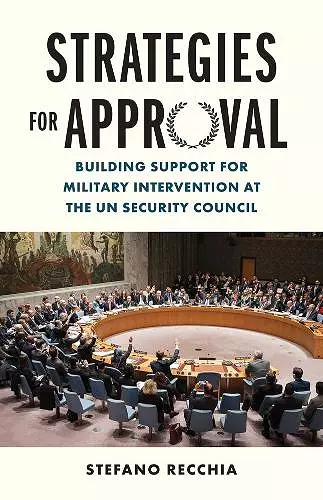Strategies for Approval
Building Support for Military Intervention at the UN Security Council
Format:Hardback
Publisher:Yale University Press
Published:28th Oct '25
Should be back in stock very soon

A thoughtful analysis of how major powers can obtain UN Security Council approval for military intervention
Powerful states often seek UN Security Council approval for their military interventions to enhance legitimacy, but how can they secure this approval when veto-wielding permanent members have grave misgivings? In this groundbreaking study of UNSC diplomacy, Stefano Recchia tackles this question by drawing on hundreds of declassified documents and interviews that he conducted with top diplomats from multiple countries.
Recchia demonstrates that since the early 1990s, powerful states facing significant opposition at the UNSC have not been able to rely solely on economic and political leverage to obtain a resolution of approval. Instead, they have had to combine exertions of leverage with credible signals that they would act with restraint and in line with core international norms. This often required that they agree to incorporate costly limitations on the use of force, such as time limits and multilateral oversight, into the requested resolution. Recchia argues that for better or worse accepting such constraints will be critical in the future if powerful countries, including the United States, are to secure UN approval in an increasingly competitive international environment.
“Recchia has produced the most careful study of the politics of UN Security Council authorization for the use of force yet written. This book proves that even the world’s most powerful states cannot rely on material leverage alone to win cooperation in that vital forum.”—Benjamin Valentino, Dartmouth College
“Recchia provides valuable insights into the strategies major powers employ to secure UN Security Council support for military intervention in the face of strong initial opposition. An excellent contribution to the study of international diplomacy.”—Richard Caplan, Oxford University
“Much has been written about why powerful states seek UN Security Council approval for military interventions, and the costs that may accrue if they fail to obtain it. In this well-researched study, Recchia asks a different question: how might they obtain such approval in the face of substantial opposition from one of the veto-wielding members. The four strategies he considers offer valuable insight not only into the dynamics of great power relations, but also how to overcome the debilitating politics that is plaguing an increasingly dysfunctional Council.”—Ian Johnstone, Tufts University
ISBN: 9780300270587
Dimensions: unknown
Weight: unknown
304 pages